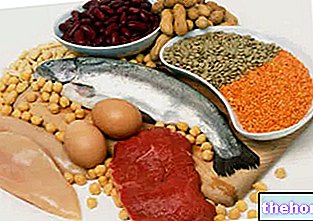Introduction
In the vast world of nutrition and clinical dietetics, in recent periods the so-called VLCDs have assumed a certain importance, i.e. Very Low Calories Diet (in Italian: very low calorie diets or very low calorie diets).
Extrapolated from their clinical context - mostly dedicated to the control and management of morbid obesity, also in preparation for bariatric surgery - VLCDs have also been particularly successful in the control of simple overweight or non-morbid obesity.
Widely used by some famous celebrities, the Very Low Calories Diet have rightfully entered the current dietary scenario as a possible nutritional alternative in the hands of the professional.

Starting bases
VLCDs are diets with very low caloric power (classically they should not exceed 800 Kcalories per day), commonly used in the treatment of morbid obesity.
These are diets significantly below the average daily caloric requirement of an adult (roughly estimated at 2000 Kcal), therefore potentially inducing a state of malnutrition.
For this reason, in order to avoid nutritional deficits, especially in the sphere of micronutrients, in most cases in these diets it is necessary to replace meals with supplements capable of respecting the strict calorie requirements, while providing all the micronutrients necessary to preserve a certain state of well-being.
Also in this case the starting assumption is represented by a strong caloric and carbohydrate limitation, which pushes the human organism towards the use of lipid reserves as the main energy source.
In these circumstances, the increased oxidation of lipids to acetic acid, in overall conditions of oxaloacetate deficiency, determines the formation of ketone bodies (precious nourishment for the brain in the absence of glucose), identifying a para-physiological situation known as ketosis.
Precisely because of these marked metabolic implications, VLCDs should not be prolonged for more than 12 weeks and should necessarily be supervised by medical personnel.
Indications
Strongly low-calorie diets are indicated:
- In the treatment of morbid obesity;
- In the preparation for particular surgical interventions in the context of obesity (eg. Adjustable gastric band or Intragastric balloon)
- In rapid weight loss linked to specific medical needs;
- In the "treatment of" obesity, even non-pathological, resistant to other dietary interventions.
There is evidence in the literature that would describe the efficacy of this type of diets, always under strict medical supervision, in the treatment of some psychiatric manifestations even in childhood.
Clearly there are still no precise indications in this regard, given the entirely experimental nature of the aforementioned studies.
Potential Benefits
Several studies seem to agree on the metabolic benefits of highly low-calorie, balanced and time-limited diets.
Among the improvements observed there would be:
- An improvement in the glycemic profile in diabetic and obese patients, with a reduction in insulin resistance;
- An improvement in the lipid profile, in particular in the blood concentrations of cholesterol and triglycerides;
- An improvement in joint mobility in the presence of obesity;
- A reduction in some inflammatory markers;
- A rapid weight loss, estimated at between 1 and 2.5 kg per week.
Possible Risks
The severe calorie restriction, the metabolic effects of the diet and the induction of the ketogenic process could expose the patient to possible side effects, such as lethargy, increased appetite, confusion, nausea, constipation or diarrhea and headache.
Furthermore, prolonged use could lead to an increased risk of nutritional deficiencies, especially in micronutrients, with alterations in the normal function of organs and systems.
Furthermore, interesting studies would show how, although VLCDs are more effective in short-term weight loss, in the long run they would instead bring additional gains compared to balanced low-calorie diets.
Contraindications and precautions
Given the nature of very low calorie diets, these dietary regimes are absolutely contraindicated during pregnancy and breastfeeding, in children and growing adolescents, in already malnourished subjects and in the presence of particular clinical conditions.
Precisely because of the invasiveness of these dietary protocols, it would seem appropriate to require careful medical supervision during all phases of this diet.
Bibliography
Effects of preoperative weight loss with a very low calorie diet (VLCD) on weight loss after biliopancreatic diversion in patients with severe obesity].
Ballesteros Pomar MD, Diez Rodríguez R, Calleja Fernández A, Vidal Casariego A, González de Francisco T, González Herráez L, Fernández VS, Calleja Antolín S, Olcoz Goñi JL, Cano Rodríguez I.
Nutr Hosp. 2013 Jan-Feb; 28: 71-7
[Very low calorie diets in clinical management of morbid obesity].
Vilchez López FJ, Campos Martín C, Amaya García MJ, Sánchez Vera P, Pereira Cunill JL.
Nutr Hosp. 2013 Mar-Apr; 28: 275-85
Comparison of a very low-calorie-ketogenic diet with a standardlow-calorie diet in the treatment of obesity.
Moreno B, Bellido D, Sajoux I, Goday A, Saavedra D, Crujeiras AB, Casanueva FF.
Endocrine. 2014 Dec; 47: 793-805.
Very low calorie diet without aspartame in obese subjects: improved metabolic control after 4 weeks treatment.
Norén E, Forssell H.
Nutr J. 2014 Jul 28; 13: 77
Effects of a very low calorie diet in the preoperative stage of bariatric surgery: a randomized trial.
Faria SL, Faria OP, de Almeida Cardeal M, Ito MK.
Surg Obes Relat Dis. 2015 Jan-Feb; 11: 230-7
Clinical Effectiveness of Weight Loss and Weight Maintenance Interventions for Men: A Systematic Review of Men-Only Randomized Controlled Trials (The ROMEO Project).
Robertson C, Avenell A, Stewart F, Archibald D, Douglas F, Hoddinott P, van Teijlingen E, Boyers D.
Am J Mens Health. 2015 Jun 30
Inhibition of Neuroblastoma Tumor Growth by Ketogenic Diet and / or Calorie Restriction in a CD1-Nu Mouse Model.
Morscher RJ, Aminzadeh-Gohari S, Feichtinger RG, Mayr JA, Lang R, Neureiter D, Sperl W, Kofler B.
PLoS One. 2015 Jun 8; 10: e0129802
















.jpg)











